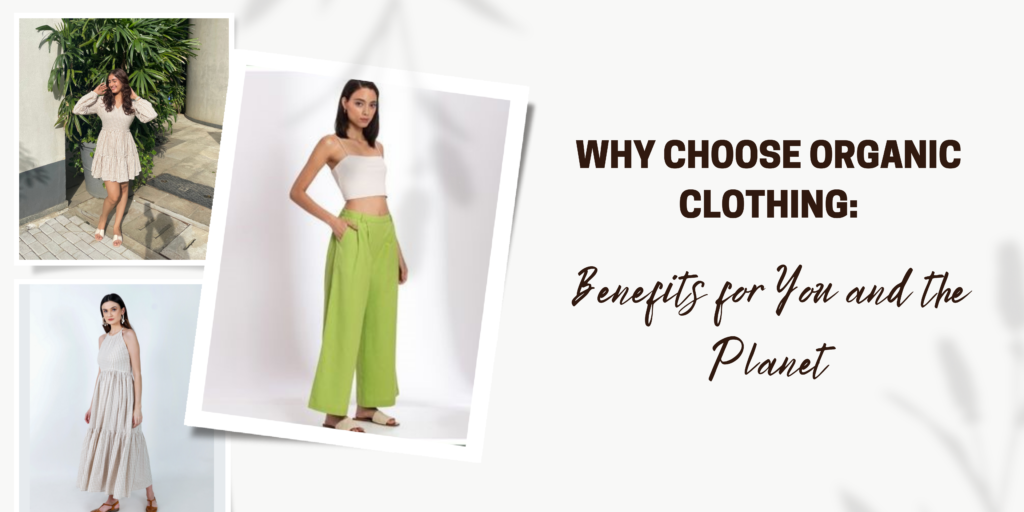
Fashion isn’t just about the clothes we wear; it’s a form of expression, a reflection of our personality, and a way to communicate without words. But have you ever stopped to think about the impact your fashion choices have on the world around you? Enter organic clothing – a sustainable and eco-conscious choice that not only benefits you but also makes a positive impact on the planet we call home. In this comprehensive guide, we’ll delve into the world of organic clothing, exploring why it’s a smart choice for both your well-being and the Earth.
What Exactly Is Organic Clothing?
Let’s start with the basics. Organic clothing is crafted from materials that are grown and processed without the use of synthetic chemicals or genetically modified organisms (GMOs). It’s like fashion in its purest form, close to nature and free from harmful additives.
Benefits for You: Why Organic Clothing Matters
- Gentle on Your Skin
Organic clothing is like a soothing balm for your skin. Conventional fabrics often undergo treatments with harsh chemicals like pesticides and synthetic dyes, which can lead to skin irritations. Organic textiles, on the other hand, are produced naturally, without these irritants. If you’ve ever experienced itchiness or discomfort from clothing, organic fabrics might become your new best friend.
- Breathability and Comfort
Ever felt like your clothes are suffocating you, especially in scorching weather? Organic materials, such as organic cotton or bamboo, are renowned for their breathability. They allow air to circulate, keeping you cool and comfortable. It’s like wearing a second skin that lets you breathe freely.
- Durability and Longevity
Investing in organic clothing is like investing in the future. These garments are often of higher quality and craftsmanship, designed to withstand the test of time. They don’t wear out as quickly as cheaper, mass-produced clothing, so while you might pay a bit more upfront, you’ll likely save money in the long run because you won’t need to replace them as often.
- Eco-Friendly Dyes
Ever wondered about the chemicals used to dye your clothes those vibrant colors? Organic clothing often uses eco-friendly, low-impact dyes. These dyes not only reduce chemical exposure but also minimize water pollution. It’s like wearing the colors of nature itself – vibrant and sustainable.
- Hypoallergenic Properties
If you have sensitive skin or allergies, organic clothing can be a game-changer. The absence of harsh chemicals and allergens in organic fabrics makes them a preferred choice for those prone to skin issues. It’s like wrapping yourself in a cozy, hypoallergenic cocoon.
Benefits for the Planet: Why Organic Clothing Matters
- Reduced Environmental Impact
Conventional cotton farming, for instance, is notorious for its heavy use of pesticides and water. Organic cotton, however, uses natural and sustainable farming methods that significantly reduce the impact on soil and water. Choosing organic clothing is akin to casting a vote for a cleaner, greener Earth.
- Support for Sustainable Agriculture
Organic clothing is a nod to sustainable farming practices. It promotes biodiversity, meaning a variety of plants and animals can coexist harmoniously on the same land. This helps maintain healthy ecosystems and fertile soil, which are essential for our planet’s well-being.
- Lower Carbon Footprint
Mass-produced clothing often travels long distances before reaching your closet. This transportation generates a significant carbon footprint. Many organic clothing brands prioritize local and ethical production, which reduces the emissions associated with shipping. Choosing organic is like taking a step towards a smaller carbon footprint and a healthier planet.
- Ethical Labor Practices
Organic clothing brands are often committed to ethical labor practices. They ensure fair wages and safe working conditions for their employees. This not only benefits workers but also contributes to a more just and equitable world.
- Reduced Water Usage
Conventional cotton is notorious for its water-intensive cultivation. In contrast, organic cotton farming uses practices like rain-fed agriculture and efficient irrigation systems, significantly reducing water consumption. Choosing organic clothing helps conserve this precious resource.
How to Embrace Organic Clothing?
Now that you know the benefits, you might be wondering how to make the switch to organic clothing. It’s easier than you think:
- Do Your Research
Start by researching brands that are known for their commitment to organic clothing. Look for certifications like “GOTS” (Global Organic Textile Standard) or “OEKO-TEX Standard 100” to ensure authenticity.
- Mix and Match
You don’t need to overhaul your entire wardrobe at once. Begin by incorporating a few key pieces of organic clothing into your collection. Essentials like organic cotton t-shirts, bamboo socks, or organic denim jeans are great starting points.
- Support Sustainable Brands
When you shop, choose brands that align with your values. Look for those that prioritize sustainable and ethical practices throughout their supply chain. Your choices can influence the fashion industry in a positive way.
- Care for Your Clothes
To make your organic clothing last longer, follow care instructions carefully. Washing in cold water and avoiding harsh detergents can help preserve both the fabric and the environment. Remember, the longer your clothes last, the less you need to replace them.
- Spread the Word
Share your newfound knowledge with friends and family. Encourage them to make conscious fashion choices too. The more people who embrace organic clothing, the greater the positive impact on the planet.
In Conclusion
Choosing organic clothing isn’t just about fashion; it’s about making a positive impact on your life and the planet. It’s a small change that can lead to a big difference. So, the next time you shop for clothes, consider going organic. It’s not just a choice; it’s a statement – a statement that says you care about your well-being and the well-being of this beautiful planet we call home. By making this choice, you’re not just dressing yourself; you’re dressing the world in a greener, more sustainable future.
Content By: Palison
